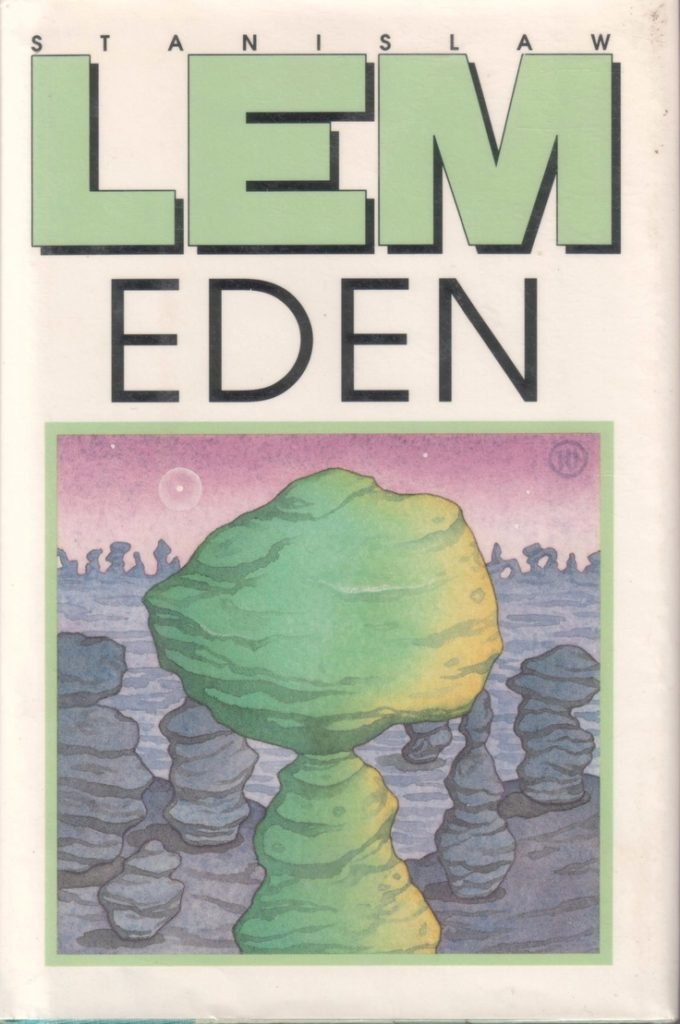 In January this year, I set myself a goal of reading six translated SF/F works. The first book on my list was Stanislaw Lem’s Eden.
In January this year, I set myself a goal of reading six translated SF/F works. The first book on my list was Stanislaw Lem’s Eden.
Eden (1959; reissue, 1989)
Written By: Stanislaw Lem
Pages: 276 pages (hardback)
Publisher: Houghton Mifflin Harcourt
Why I Chose It: I had read Lem’s most famous work, Solaris (published two years after Eden), and I’m a fan of the original movie; the 2002 Soderbergh/Clooney version is pretty but doesn’t come close to how solitude (or bizarre planets) can just drive you crazy. (I do adore the shiny control room.) Solaris set the stage for just about every subsequent space horror film, even though I wouldn’t necessarily classify it as “space horror.” Eden had a similar premise.
The Premise:
A six-man crew crash-lands on Eden, fourth planet from another sun. The men find a strange world that grows ever stranger: a desert plain exuding acrid vapors, a greenish tinge at the horizon, a gray seven-foot tree that hisses and withdraws into the ground when touched, and thickets of vegetation like hanging spiders.
In a labyrinth of plant-shaped buildings are dead ends, passage-ways, domes, vaulted ceilings, and giant statues. And everywhere there are images of death: mass graves, naked bodies in ditches and wells, a beehive structure filled with clusters of giant eggs — a skeleton within each egg.
The crew’s attempt to communicate with this civilization leads to violence and to a cruel truth — cruel precisely because it is so human.
No spoilers
Discussion:
It took me two attempts to read this book. I started it way back in March, hated it, put it down, and picked it back up in late summer. Still hated it. But I finished it. I just had no idea how the hell I would review it. This book left me all mixed up.
Eden is a bizarre story. What. The. Shit. I wondered more than once what I had got myself into. Yes, I wanted an unconventional first-contact story where neither party could understand each other (yes, I knew it wouldn’t go well) or even have any kind of common ground to build an understanding. Lem specialized in that kind of thing. But the first three fourths of the story is… Dull. Even after the six men (unnamed and known only by their capacities as Captain, Engineer, etc) have crawled out of their crashed ship and set off to explore the planet. There are some nice, imaginative “sensawunda” feels as Lem describes the bizarre landscape—one full of dangerous plant forms, mysterious ruins, and a sentient society. Then the crew finds more ominous signs that Eden may look pretty from afar, but it is not, well, paradise.
I liked listening in on the crew as they attempted to puzzle it all out. So I got my “truly alien planet” fix, I guess. The underlying themes – I’ll get to those below – are very disturbing. The juxtaposition of these themes with a beautiful, strange planet and an inability to find out exactly what’s going on left me off guard.
The features of the planet, including the society the crew observes and interacts with on a certain level, are never truly explained. The crew has many theories, of course, and there is some explanation at the end, although, again, it is mostly theoretical. So we may never know anything true about Eden.
Another thing that put me off is, of course, this: no women. That crew is six men. I know, it was written in 1959. But still. I NOTICED.
Conclusion:
I did expand my horizons, and I understood the story’s finer point: fear and anger should never be used to govern a society. (Francesa Haig’s The Fire Sermon, reviewed here by Carey Ballard, builds on some of Eden’s premises). The crew’s theorizing struck me as dangerous. It’s what we as humans do when we’re faced with incomprehensible sights. We want to frame it somehow, to make it explainable. But what happens when you can’t?
I can’t recommend Eden as a first encounter with Lem’s work. Or even perhaps a second. To be fair, I wanted a kind of culture shock. I’m the kind of person who thinks Star Trek’s universal translator is a total cop-out. Lem thought that way too (even if Star Trek post-dates Eden & Solaris). I liked reading something different, but Eden was a complex slog. Even Lem decided it was a “rather unsuccessful book.” Of course, he may have been comparing it with his other works – we writers all have our favorites – and Russian or world SF in general.
As far as explanations go, I don’t have to have them. I immensely enjoyed Jeff Vandermeer’s Southern Reach trilogy in part because of its ambiguity. It didn’t really bother me that many things weren’t explained about Eden. First contact should be difficult – just like in Ted Chiang’s “Stories of Your Life And Others” (aka Arrival). It’s just that the story itself is not really cohesive.
Eden has not put me off Lem, of course – but it will be awhile before I pick up another Lem book.

No Comments